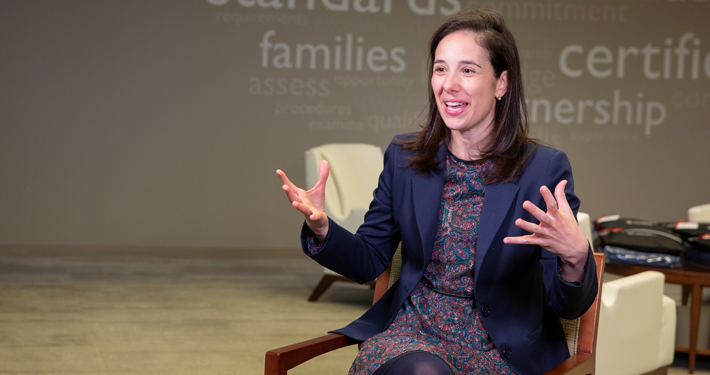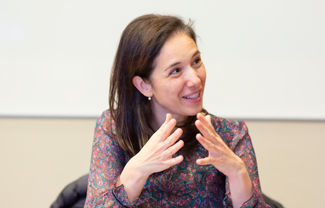
As a physician, educator, and researcher, Gina Badalato, MD, Associate Professor of Urology at Columbia University Irving Medical Center, brings a multidimensional perspective to the medical field—one that is rooted in dedication to patient care, education, and the continuous evolution of professional standards.
Certified by the American Board of Urology in urology and a noted expert in voiding dysfunction, female urology, and stone disease, Dr. Badalato’s influence extends far beyond the clinical setting. Her involvement with the American Board of Medical Specialties (ABMS), including as a member of the 2022–2023 cohort of the ABMS Visiting Scholars Program™ and a current member of the ABMS Stakeholder Council, marks her as a key contributor in shaping the future of specialty certification and patient centered care.
A Path Forged by Passion and Mentorship
Dr. Badalato’s journey into the field of urology was sparked by a deep appreciation for the specialty. “I chose urology because I love the medicine and the surgery embodied in the field,” she explained. “At the time I was training, there were not many female urologists, and I saw that there was an opportunity to help with women’s health issues that pertain to the field of urology.”
A graduate of Columbia University College of Physicians and Surgeons—where she also completed her residency and fellowship—Dr. Badalato was inspired by Columbia’s rich educational environment. “The mentorship and the early exposure I experienced as a student at Columbia were very compelling reasons for me to choose the field,” she said. “And I haven’t regretted it since.”
Because mentorship played such a large role in her career path, Dr. Badalato enjoys mentoring today’s medical students and early-career physicians. She currently serves as Vice Chair of Education and Faculty Affairs and the Assistant Dean of Student Affairs for the Columbia University College of Physicians and Surgeons.
Elevating Certification Through Scholarship
Dr. Badalato’s dedication to excellence in medical education led her to apply for the ABMS Visiting Scholars Program, where she completed a comparative analysis of oral board delivery and outcomes across surgical disciplines. Her project—What are Best Practices? A Comparative Analysis of Oral Board Delivery and Outcomes Across Surgical Disciplines—sought to uncover meaningful insights into how assessment can be optimized across specialties. The experience was not only academically enriching but also professionally transformative.
“Being part of the 2022–2023 ABMS Visiting Scholars cohort was incredible,” she recalled. “I was inspired by my experience. The group was amazing—we had leaders from various disciplines, and the collaboration opened my eyes to how much we can learn from one another.”
The Meaning of Certification
When asked about the significance of board certification, Dr. Badalato’s response was both passionate and thoughtful. “Board certification is important on so many levels,” she said. “From a patient facing standpoint, it is a crucial qualification. ABMS and its Member Boards strive to protect the public and ensure safety. Board certified physicians go through extra vigorous training, testing, and continuing education to ensure that they are up to date with policies, procedures, and guidelines.”
But for physicians, the value of certification goes far beyond the initial examination. “Board certification has challenged me in every way. It is certainly a major milestone in a urologist’s career,” she added. “You are vetted by your peers—in some cases, role models who have authored textbook chapters that you’ve read or have developed the surgical techniques you’ve learned about—and once you’ve passed over all those challenging hurdles, you are officially a member of this professional community. It is validating and connects you to a society that is committed to growth and excellence.”
In her role as an advisory dean, Dr. Badalato works with medical students from their first year of medical school and beyond. “Many of these students initially view board certification as another extremely difficult test they have to prepare for. I remind them that, as a physician, they are committing to the Hippocratic Oath, which includes a lifetime of study and testing yourself so that you can be the best doctor you can be.”
Joining the ABMS Stakeholder Council

After her ABMS Visiting Scholars experience, Dr. Badalato was nominated and elected to the ABMS Stakeholder Council—an advisory body to the ABMS Board of Directors. The Council represents physician and patient/public interests, ensuring that ABMS decisions are grounded in the perspectives, concerns, and interests of the multiple constituents impacted by its work.
The Council, either by its own initiative or at the request of the ABMS Board of Directors, offers specific recommendations regarding new or existing ABMS activities, initiatives, plans, policies, programs, or strategies arising out of or related to certification. It does this by drawing on its diverse composition of five Associate Members, six Public Members, two At Large Member Board executives or trustees, one credentialing community representative, and up to ten active diplomates (practicing physicians not serving in leadership roles in their specialty society or board) participating in continuing certification.
“I wanted to be part of that larger group and that larger conversation—how to educate people about certification, future initiatives, and innovation,” Dr. Badalato said. “As part of our work on the Stakeholder Council, we talk about what we can do together to continue to advance patient care and continue to recruit and inspire the next generation of physicians. There is a lot of work to be done, and I am excited for the next steps,” she said.
“The Council is agnostic to specialties,” she explained. “You have leaders in education, organized medicine, and patient interest groups. It is a table full of caring people with diverse perspectives and talents coming together to enhance our member groups and to improve board certification.”
Dr. Badalato found the Council to be an incredibly welcoming and collaborative team. “As a relatively junior member, I was pleased with the generous welcome I received, especially from the more senior leaders from diverse organizations. They were truly invested and committed to giving me a voice and hearing my opinions,” said Dr. Badalato.
If they are looking for their next challenge, Dr. Badalato recommends that physicians get involved as volunteers with their certifying board or ABMS. “Volunteering with ABMS and its Member Boards is a great opportunity to get involved in something bigger than yourself that can impact the future of medicine and patient care,” she said. “It’s also a way to network and meet people from different disciplines who think about these larger issues in a different way than you do, to help expand your thinking, and come up with new answers.”
Bridging the Gap with Patients
One of Dr. Badalato’s priorities is increasing public awareness around board certification. “The average patient knows very little about what board certification really means and entails” she noted. “Some might look into it retroactively if they’re questioning their care, while others rely on the reputation of an institution.” She believes that better communication about the importance of certification is vital for empowering patients and ensuring quality care, particularly in underserved or rural areas.
Dr. Badalato emphasizes the need to support physicians practicing in areas with limited resources. “How can we enhance their practice and welcome them into the fold?” she asked. “That’s just one of the many critical issues we have discussed in the Stakeholder Council.”
Looking Ahead
For Dr. Badalato, the future is one of continued learning, collaboration, and advocacy. Whether she is mentoring students, researching best practices in medical education, or contributing to national conversations on board certification, she remains committed to the ideals that first drew her to medicine: a love for learning, a commitment to patients, and a passion for pushing the profession forward.
-
Read More:
- ABMS Scholars |
- Profiles |
- Research |
